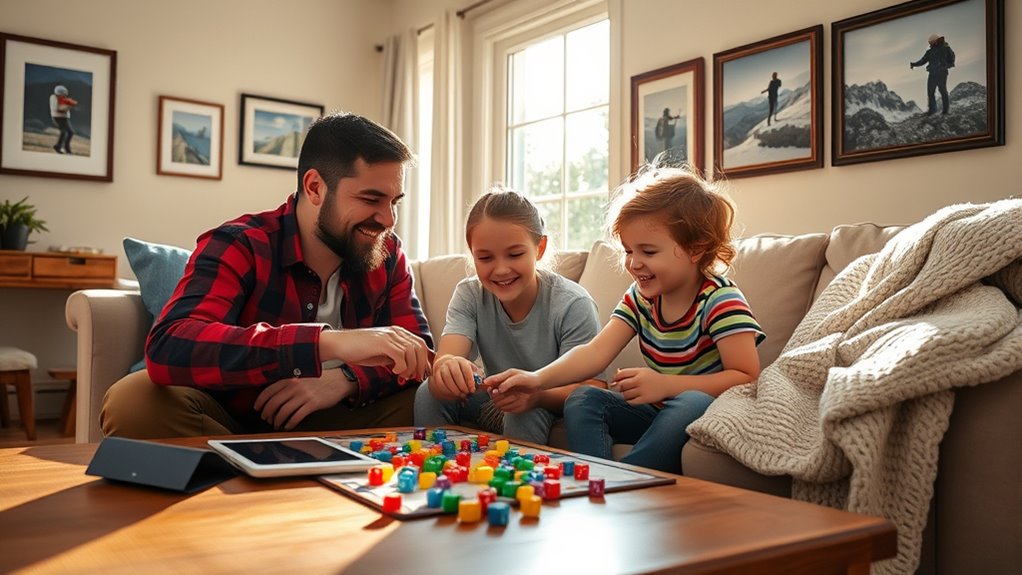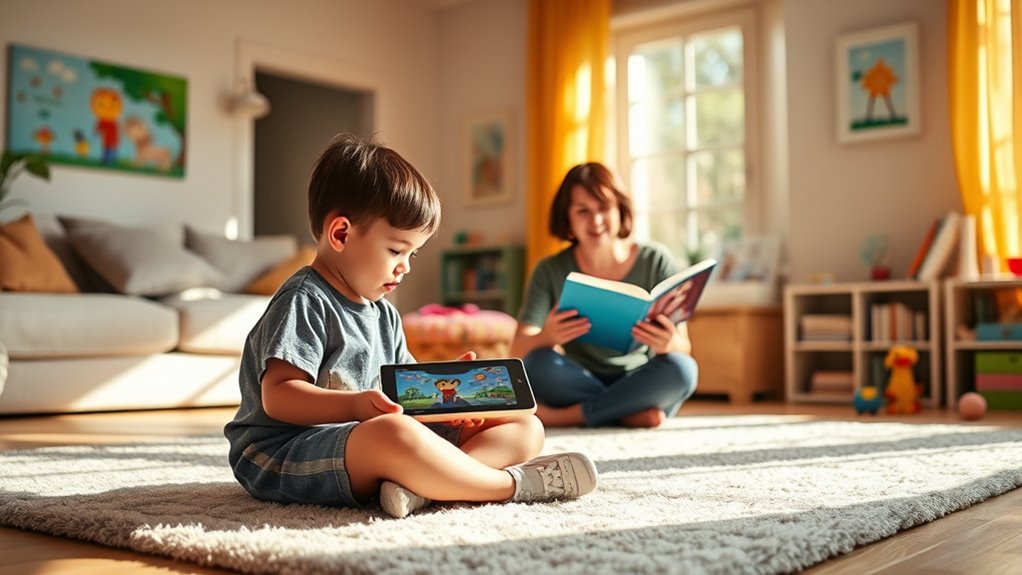Managing screen time for your kids is essential for their growth. For children under 2, avoid screens, except video chatting. Limit kids aged 2-5 to one hour of high-quality programming daily and aim for one hour for ages 5-12. Monitor teenagers’ screen time, capping it at two hours for recreation. Set clear rules, encourage outdoor activities, and choose educational content. Looking for more tips on fostering healthier screen habits? There’s plenty more to explore!
Key Takeaways
- Set age-appropriate screen time limits to ensure consistency and promote healthy usage habits.
- Encourage alternative activities like outdoor play and hobbies to reduce reliance on screens.
- Create screen-free zones during meals and bedtime to foster family interaction and healthy routines.
- Monitor content quality by selecting educational and interactive programs that promote learning.
- Model healthy screen behaviors and engage in screen-free activities together as a family.
Understanding Recommended Screen Time Limits

When it comes to managing screen time for kids, understanding recommended limits is essential. The American Academy of Pediatrics suggests specific guidelines based on age.
Managing screen time for kids requires understanding age-based guidelines from the American Academy of Pediatrics.
For children under 2, avoid screens except for video chatting. Kids aged 2-5 should have no more than one hour of high-quality programming daily. For ages 5-12, aim for one hour, excluding schoolwork, while teenagers can enjoy up to two hours of recreational screen time.
It’s vital to balance screen time with activities like reading and outdoor play. Designating screen-free zones and times, especially before bed, can improve sleep quality.
Involving your family in setting realistic goals makes managing screen time more effective and consistent.
The Impact of Screen Time on Child Development

As kids increasingly engage with screens, it’s essential to recognize how this exposure can shape their development. Excessive screen time can delay language skills, particularly by age 3 or 4, and hinder communication and problem-solving abilities. You might notice decreased attention spans and difficulties focusing as well.
Additionally, high screen usage can negatively impact memory and critical thinking due to structural brain changes.
Socially, screen time can interfere with social skills and emotional regulation, leading to behavioral issues. It can also reduce the quality of parent-child interactions, resulting in lower empathy.
Moreover, excessive screen time is linked to mental health concerns, lower self-esteem, and developmental delays, ultimately affecting academic performance and learning opportunities.
Effective Strategies for Reducing Screen Time

To effectively reduce screen time for kids, it’s essential to implement practical strategies that work for your family.
Start by setting clear screen time limits based on age—no more than one hour for kids aged 2-5 and two hours for those 6 and older. Communicate these rules and their importance, ensuring consistency to avoid conflicts. This consistency helps promote emotional and psychological growth as children learn to navigate boundaries. Research shows that excessive screen time can impact newborn development negatively, making it important to set limits early on. Additionally, fostering healthy family interactions creates a supportive environment that encourages children to engage in activities beyond screens.
Encourage outdoor activities, hobbies, and creative pursuits to provide alternatives to screens. Structuring daily routines helps integrate screen time without clashes, so plan shifts and give advance warnings before time ends.
Designate screen-free zones during meals and bedtime to promote family interaction and better sleep.
Finally, leverage parental controls to monitor usage and enforce limits effectively. Additionally, consider incorporating digital literacy programs that teach kids about healthy screen habits and the impact of technology on their lives.
The Role of Parents in Managing Screen Use

Managing screen time effectively involves not just setting limits but also recognizing the pivotal role parents play in this process. You can use parental controls to set time limits, block inappropriate apps, and monitor usage. These tools help guarantee your child engages with age-appropriate content while promoting healthy habits. Additionally, understanding the importance of long-term financial planning can help families allocate resources for activities that reduce screen time, such as engaging in outdoor adventures or creative pursuits. Establishing a bedtime routine for your children can also limit screen time, ensuring they have a consistent time to unwind before sleep. Incorporating creative expression activities into your family’s routine can provide enriching alternatives to screens.
Your own screen time also influences your child’s habits; modeling healthy behaviors is essential. Establish clear rules and routines for both you and your kids to create a balanced family environment. Encourage open communication about these rules to foster understanding and cooperation. Additionally, engaging in non-screen activities as a family can provide healthier alternatives, reinforcing the importance of managing screen time together. Couples may benefit from shared goals that prioritize family time over excessive screen use, helping to cultivate stronger bonds.
Choosing Quality Content for Better Outcomes

When it comes to screen time, choosing quality content can greatly impact your child’s development and well-being. Opt for educational programs that support learning outcomes and enhance academic skills.
Interactive content, like puzzles or educational games, boosts cognitive and problem-solving abilities. Look for media that promotes language and literacy, especially for preschoolers. Quality content also fosters social skills and empathy.
Use media rating systems to help select age-appropriate and educational options. Remember, active screen time activities, such as video games or interactive lessons, are beneficial, while passive activities, like watching TV, can lead to poorer outcomes.
Engaging with your child during screen time can further enrich their learning experience and understanding.
Frequently Asked Questions
What Are the Long-Term Effects of Excessive Screen Time?
Excessive screen time can lead to several long-term effects on your health and well-being. You might notice increased risks of obesity, sleep disturbances, and vision problems.
Mentally, it can contribute to anxiety, depression, and social withdrawal.
Cognitively, you could face delays in language development, reduced attention spans, and impaired problem-solving skills.
How Can I Encourage Non-Screen Activities for My Child?
Imagine your child blooming like a flower in the sun, thriving in the great outdoors. You can encourage non-screen activities by organizing fun outdoor adventures, like bike rides or nature walks.
Set up an obstacle course in the backyard to spark excitement, or join a local soccer team together for teamwork and socializing.
Immerse yourself in arts and crafts, letting their imagination paint vibrant worlds. These activities not only build skills but also create cherished memories.
What Signs Indicate My Child May Be Overusing Screens?
If you notice your child becoming irritable, having trouble making eye contact, or displaying restlessness, they might be overusing screens.
Look for physical signs like headaches or eye strain, and watch for changes in their sleep patterns.
If they prefer online interactions over face-to-face connections or struggle with emotions, these could be red flags.
A defensive attitude when discussing screen time can also indicate an unhealthy dependency on devices.
Are There Apps to Help Monitor Screen Time Effectively?
Yes, there are several apps designed to help you monitor screen time effectively.
Apps like Screen Time and Google Family Link let you set limits and track usage on devices. Qustodio offers extensive monitoring, while Mobicip provides app blocking features.
These tools not only help you manage daily screen time but also promote healthier habits by giving you insights into your child’s digital activities.
Using these apps can enhance your confidence in managing their screen time.
How Can I Involve My Child’s School in Managing Screen Time?
Imagine a garden where students flourish like vibrant flowers, needing sunlight and shade in equal measure.
To involve your child’s school in managing screen time, start a dialogue with teachers about their policies. Encourage them to integrate structured lessons blending screen use with offline activities.
Suggest regular updates between home and school to keep everyone informed. By collaborating, you can cultivate a balanced environment that nurtures both learning and well-being.
Conclusion
In summary, managing your child’s screen time isn’t just a parenting tip; it’s a superpower that can shape their future. By understanding recommended limits and choosing quality content, you can greatly influence their development. Remember, your role as a parent is essential in guiding their screen use and fostering healthier habits. With a few effective strategies, you’ll not only reduce screen time but also open up a world of opportunities for growth and connection in your child’s life.









